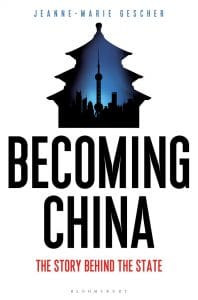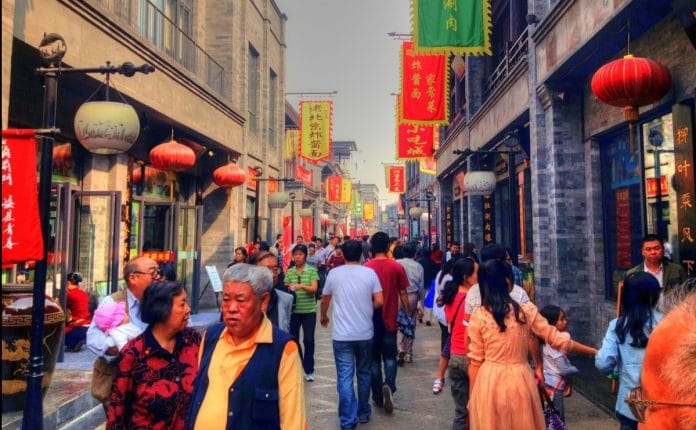‘Becoming China: The Story Behind the State’ is an excellent starting point for someone wanting to move beyond a traditional, i.e. statist, understanding of China.
In the last 25 years, China has grown assiduously –contradicting the basic rules of growth. For the rest of the world, the sun has suddenly started to rise from China. How does one, then, make sense of its present and the unforeseeable future?
In her book Becoming China: The Story Behind the State, Jeanne-Marie Gescher looks for answers in history. Not only the medieval and the ancient, but also the myths and stories that the Chinese people have told each other, about each other and for each other from the beginning of time.
Though titled ‘…The Story Behind the State’, the book is a story about this story. When Gescher, a renowned China expert, dipped her thoughts into the river of Chinese myths, the invigorating waters of the Yellow River smeared her historical narrative with the qualities of Marquez’s magical realism, at the same time exposing the halo around the sword of historical revisionism. A sword used often in the construction of Chinese history by various shamans, emperors, revolutionaries and party intellectuals.
Even though extremely well-researched and referenced, the author’s fablesque narrative style may become the book’s Achilles heel, when scholars of history find the 30-page reading list at the end of the book more useful than the book itself.
Nevertheless, the book is an excellent starting point for someone wanting to move beyond a traditional, i.e. statist understanding of China.
It may be the case that the book’s only criticism is coming too early, considering that this is the first of a quartet the author has planned, but it is safe to assume that Gescher’s style of historicising nations and nationalities has a distinct epic quality that is here to stay.
Easy, enthralling
The nearly 800 pages of this book are divided into three sections. Covering the breadth of Chinese history from the Shang dynasty’s beginnings in 1600 BCE to preparations for the 19th party congress in late 2017 is no easy task. The author however, makes it look not only easy but enthralling too.
By identifying central themes and presenting historical facts in the context of grand debates the Chinese people have grappled with since time immemorial, the author has succeeded in knitting a yarn complex in its design, but pleasing to the eyes.
From time to time, the reader may feel the urge to read the text aloud to those around him/her, regardless of their age. This remains the books highest compliment. Without focusing too much on the historical details of the origin of ideas like Daoism, Confucianism, Taiping, and retaining an ethereal fable-like quality of narration, the book is able to bring out the lived aspect of these ideas by placing at the centre the Chinese people and their interpretations of these ideas.
The second section rushes the reader through the 19th and 20th century – the slow demise of the Manchu Qing dynasty, the Republican Party’s rule, China’s role in the two world wars, the Communist revolution, and the Communist party’s rule ever since.
The narrative evokes an interpretation that though the present is new and revolutionary in appearance, it remains rooted in and informed by the past. The Chinese people insist on maintaining communications between heaven and Earth, and repose faith in the son of heaven and his absolute authority over controlling such communications.
They also dearly cling to an unalienable fear that their faith in the son of heaven will eventually let them down. The hand they chose to rule over them will ultimately transform into an iron fist. The author’s approach, to stick to the themes isolated and identified in ancient Chinese history, is refreshing and in line with a new wave of historical writing.
Instead of a dreary recollection and presentation of well-researched facts, this new genre delves into universal debates on human nature, order and justice, thus resorting to the most effective attribute of human communication and memory – storytelling.
By using the same myths as people, the party has unabashedly indulged in historical revisionism by concocting a myth of national humiliation, civilisational resurrection, party sacrifices and a formidable virtuocratic merit in party ideology and behaviour. Nevertheless, the party’s iron fist on stability management, and its insistence on order over justice, well supported by numerous accounts of activists, intellectuals and whistle-blowers who have disappeared and reappeared, over the years, has not weakened the Chinese spirit.
At the end of the book, you are left with a strong feeling that snow may fall in the summer. That change is just around the corner, the China we know today – an international power to be reckoned with – is a ticking time bomb.
Hidden under party censorship, the tinge of dissent runs deep in Chinese blood. Tapping into the theme of the ancient Confucian ideal of zhi – the pursuit of knowledge – innumerable dissenters and their supporters have risen to ask age-old questions. How valid is the idea of China’s unity as a top-down order? What about unity of self-cultivated people? Why not have a fifth modernisation along with Deng’s four – Democratisation? What about the atrocities of the party? Do the people deserve a truth and reconciliation commission?
A challenge to the narrative
Becoming China: The Story Behind the State is the story of Chinese people trying to figure out what it means to be Chinese. For the rest of the world, the party is China, but for Gescher the whole is grossly misrepresented and less than the sum of its parts. By reaffirming the ancient Chinese belief that an iron fist that tries to grasp the world ultimately fails, the book gives hope. Hope for democratic reforms? Another revolution? Party reforms? It doesn’t specify.
The book presents a challenge to the party’s narrative, its constant self-aggrandisement, and the selective amnesia vis-a-vis history.
Cao Xueqin, a classical novelist from the Qing period wrote, “Truth becomes fiction, when the fiction’s true; real becomes not-real where the unreal’s real.” Contemporary trends in world politics point to how accurate he was. And even though resilience and dissent are human characteristics, the Chinese people have been eating bitterness, a quality they call chiku, since long before they were first unified under the Qin Empire.
Today, the party’s ideological hegemony has repackaged and incentivised chiku to an extent that in the same meadows where a hundred flowers once bloomed, people shudder at the thought of spring. Hence, it remains to be seen how tenacious the hope that the book instils is.
Gaurav Saini is a research scholar at JNU, Delhi
 Jeanne-Marie Gescher’s Becoming China: The Story Behind the State has been published by Bloomsbury Caravel
Jeanne-Marie Gescher’s Becoming China: The Story Behind the State has been published by Bloomsbury Caravel






